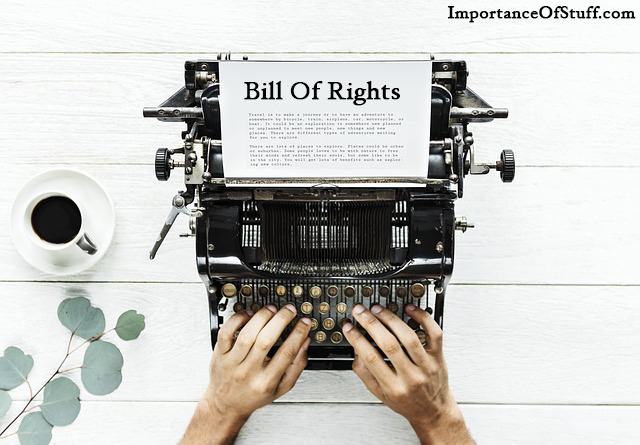Why Do We Need A Bill of Rights?
Have you ever thought about what could have happened to your lives if you were so restrained by the system that taking even a small step forward seemed to be impossible and painful? This is what exactly would have happened if there was no Bill of Rights. It includes the first ten amendments mentioned in the constitution, which addresses the basic rights of a citizen.

The History and Origin of the Bill of Rights
The Bill of Rights became a vital part of the Constitution of US on December 15, 1791. The controversy between the federalists and the anti-federalists in 1787 when the constitution was written by the Second Constitutional Convention eventually led to the inclusion of the Bill of Rights. The Bill had come into the picture when the system of slavery and other inhuman treatments were prevalent in the country. Thus, to limit the power of the government on the citizens, the Bill was implemented into the constitution.
Why the Bill of Rights?
Bill of Rights prevents the dictatorship of the government. It makes sure that all the basic rights of a citizen are protected and not violated by any system. In some of the countries, due to the lack of this Bill, the people’s basic rights which include their right to speech, religion, and assembly are being denied even today. Thus, the Bill of Rights is indispensable for the implementation of a democratic government.
The Amendments in the Bill of Rights
The First Amendment – This amendment forms an integral part of the Bill of Rights. It ensures the citizens of their five basic rights. They include:
- Freedom of Speech
- Freedom of Religion
- Freedom of Press
- Freedom of Assembly
- Freedom of Petition
The Second Amendment – This amendment allows the citizens to ‘keep and bear arms’. Though this amendment is implemented primarily to maintain a “well-regulated militia”, it has also led to many controversies regarding the right of a citizen to have gun control.
The Third Amendment – During the Revolutionary War, the people were forced to provide food and shelter for the soldiers. To protect people from getting abused by them, the amendment on ‘Housing Troops’ was included in the constitution as a result of which the citizens can no longer be pressured by the government to accommodate the soldiers.
The Fourth Amendment – In order to avoid improper searches of homes or possessions, the act on ‘Searches and Seizures’ was made. It prevents the authorities from searching a property without a detailed warrant and also a good reason.
The Fifth Amendment – The fifth amendment protects the right of suspects or anyone accused of a crime. It covers the right of the accused, due process of law and eminent domain. Let us take a look at this amendment in detail.
- Rights of the accused – As per this amendment, all suspects are innocent until proven guilty. When a person is accused of a crime, a grand jury is formed to gather the necessary evidence to prove the crime committed by the accused. It makes sure that nobody gets punished without sufficient evidence and also states that a person cannot be tried twice for the same crime.
- Due Process of Law – As per this right, the government has to follow a set of legal procedures and methods before convicting a suspect.
- Eminent Domain – It is literally the government’s right to undertake a property from a citizen. But as per this law, the government has to pay a reasonable price to the citizen in return for the property taken from him.
The Sixth Amendment – This is an important amendment as it helps to save a citizen from a falsely accused crime. As per this, every accused has the right to a lawyer. This amendment ensures ‘Fair and Speedy Trials’ for everyone.
The Seventh Amendment – This guarantees the citizens to have a jury trial in civil cases which involves property worth more than $20.
The Eighth Amendment – To protect the people from inhuman treatment and self-incrimination, the law on ‘Bails, Fines and Punishments’ was executed. As per this law, a citizen is not liable to pay high bails and fines to the authorities for any reason.
The Ninth and Tenth Amendments – These amendments address the liberties of the state and its citizens which are not listed in the current Bill of Rights. These are called ‘Reserved Powers’.
Also read: Importance of documentation
Hence, from a broader perspective, the Bill of Rights serves as the keystone of the basic rights and liberties of a Citizen. To ensure a peaceful living and an impartial judiciary and government this Bill is inevitable.